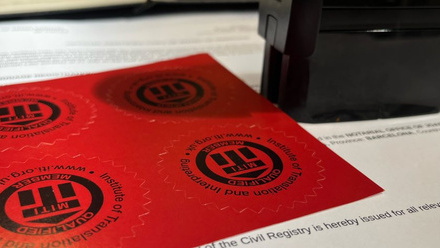Official translations
Understand certified and other types of official translations.
An 'official' translation is generally defined as a translation that has been stamped by an authority. 'Official' requirements vary from country to country, depending on that country’s particular legal system. Each country will also have its own system for appointing and regulating official translators. As a result some confusion arises over what constitutes an 'official' translation.
In the UK, Qualified ITI Members (MITI translator or FITI translator) and Qualified Members employed by Corporate ITI members (Language Service Providers) can affix ITI Certification Seals to certify a translation. This renders the translation 'official', in the sense it has been done and/or certified by a Qualified ITI Member.
ITI recommends that you obtain clear instructions regarding certification and the use of seals from the organisation requesting the translation, so you can discuss this with your chosen translator.
Types of official translation
Below we explain some of the terms often applied to translations:
Certified translation
To certify a translation, the translator must attest that the translation is a true, complete and accurate translation of the original document.
Each page of the translation should be stamped and/or initialled (by the translator and/or certifying authority), to prevent any tampering or misuse. Qualified Members (MITI translator or FITI translator) and Qualified Members commissioned by ITI Corporate members (Language Service Providers) can certify translations and purchase ITI Certification Seals, to certify their work and confirm their membership of the Institute.
Legalised or Apostilled translation
Translations cannot be sealed with an Apostille stamp unless they carry a declaration endorsed by a Notary Public. Generally speaking, the original document (which may not be a UK document) will bear the Apostille. The competent authority for issuing Apostilles in the UK is the Foreign and Commonwealth Office (FCO).
An Apostille verifies the authenticity of the signature and ensures that the document is recognised in all states that signed the Hague Convention of 1961; it does not endorse the content of the document. Find out more and see a list of Apostille Countries. If you require an apostille, please contact the Legalisation Office.
Notarised translation
A notarised translation usually means that the translation either a) carries a declaration by the translator that has been signed by the Notary or b) carries a declaration by the Notary Public concerning the original document and the translation.
Notarised translations are usually for the purpose of making them 'official' for overseas use and for providing accountability in terms of the translator’s details. The Notary’s signature cannot endorse the quality of the translation, unless s/he is a Qualified ITI Member in the language of the translation.
Sworn translation
In the UK, as a common law country, there is no such thing as a sworn translator. However, in civil law countries such as France, Spain, Germany and Italy, sworn translators (usually with a degree or other equivalent qualification in translation) are appointed and accredited by the relevant government authorities.
Depending on the country, only sworn translators who are listed on the official list of sworn translators may produce a 'certified', 'sworn' or 'official' translation. If in doubt, please seek advice from the Embassy of the target country.
More resources



